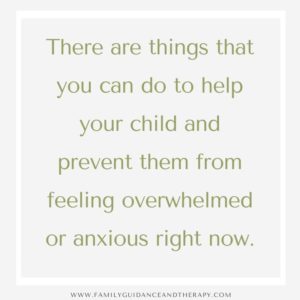The Impact of COVID on Our Kids
To protect our children during the pandemic, we have resorted to virtual school at home. Sadly, the tables of protection are turning on us.The progress that we are seeing in keeping our kids safe from the virus has sadly been marred by a spike in suicides, with some of the children being as young as elementary school age.
We need to ensure our children receive the support that they need to cope with anxiety and depression in today’s unfamiliar circumstances. We need to determine how we can help our kids navigate stresses from school even when they are not attending ‘normal’ school.
How Virtual School Stress Affects Our Children
Social isolation
Social isolation is a leading factor that can lead to anxiety in our children.
Today, children not only miss the interactions and social contacts that they had while attending in-person school, but school also was a place where they had a separate life, they built peer relationships, and they got away from (perceived and/or actual) stresses from home.
Worry about illness or death
Worrying adds an extra layer of anxiety to our children’s mental health in this pandemic. The entire world is experiencing this, and as an adult, we may know how to cope, but as a child, it can feel crushing as it combines with other stresses, especially when there is no social or peer outlet (such as school) to turn to. (the world is a scary place to kids right now, here are some ways you can help them open up and cope.)
Disrupted routines
Disruption in the routine also contributes to depression and anxiety in our kids. Before virtual school became a ‘thing’, your child may have grumbled about getting up early, gathering their books for school, or doing their nightly homework, but this was routine. When routines are yanked away from children, the adjustment can feel incredibly overwhelming.
Combining school with the home
Some children experience immense anxiety when they are required to open a camera in their home. Children may not want other people to see inside their home. They may feel anxious about combining school with their home environment. This can be especially stressful for underprivileged children.
Technology difficulties
Struggles and difficulties with technolohy are stressful. Some children, adults as well, are better suited to a classroom situation vs. learning that requires the adoption of technical skills. Virtual school leaves little wiggle room for those that struggle with technology.
Despite the multitude of reasons our children may struggle with anxiety that arises from virtual school, know that there is hope. There are things that you can do to help your child and prevent them from feeling overwhelmed or anxious.
How to Help Our Kids Navigate Life with Virtual School Stress
The first step in helping our kids navigate the stresses that evolve from virtual school involves you. As the parent, the foundation of your home, you must present yourself as calm and not besieged by the changes in routine that come with at-home school.
Listen to your child and create a safe space for them to share.
You must become your child’s best listener. If your child is feeling depressed or overwhelmed, they may not be able to see beyond their own state of mind. Acknowledge their struggles and help them find a way out of their stress.
Instill in your child that they are not alone in handling their struggles. Remind your child of their individual strengths and potential.
Through listening and reassuring your child that your family solves problems together, you create an environment where your child feels safe with sharing their emotional life. You help your child to no longer feel alone with traumatic anxiety and overwhelm.
Struggling to communicate with your teen? Here is some help.
Ask your children what they might be struggling with.
If your child does open up to you with their struggles, offer them hope and reassurance. Ask your child what they need and support them in getting it. If your child refuses to confide, ask your child if there is someone else that they would feel more comfortable talking to and get that outlet for them.
It is healthy to tell your child that everyone is struggling right now with virtual school and other changes that the virus has brought into our lives. But remind your child that you and your family love each other and are getting through this together. Remind your child that you encourage open communication. This will help your child to feel safe about opening up and will prevent feelings of isolation.
Help your child with online school.
Determine if there are areas of your child’s academics that you can assist with. Your child may have organizational problems, or they may experience problems logging into school on time. Assure your child that they are not alone with these struggles…help is as close as asking for it.
If your child tells you that they do not like being in front of a camera, ask the teacher if the camera can be turned off, or ask the teacher for advice.
Things to Watch for in Your Children
Falling behind at school is a warning sign that your child is struggling. When children fall behind in school, they can easily get into feelings of hopelessness.
Watch for sudden mood changes. Layers of difficulties can lead to overwhelm, and when your child is trying to deal with heaviness, their behavior and mood will often reflect it.
Your child may also display signs of depression, anxiety through health or behavior issues, such as sleeping more or less than usual, not eating enough, eating too much, drug use, or physical symptoms such as stomach aches, nausea, or headaches.
Your child may not spontaneously approach you with their difficulties. If you do feel that they have become quiet or withdrawn, regard this as a sign of possible depression or overwhelm. Do not wait, however, for the presence of indicative major ‘signs’ that your child is struggling. Sit down and talk with your child, or bring in someone else that your child trusts and feels comfortable with and will open up to.
Help is Here for You and Your Child
Even if you do not think your child is at risk, suicide can be prevented. Remember that parents and family members can play an integral role in keeping kids mentally well. We know that you care. If you feel that you or your child might need mental health care, do not wait.
We know you want the very best for your child. You hurt when they hurt. We are here to support your child to learn healthy and practical coping skills that will serve them for their lifetime.
We can help. Make an appointment online or call 619-600-0683.

